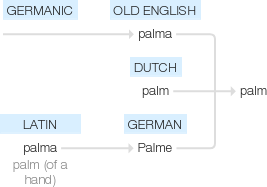Palm
Old English palm(a), of Germanic origin; related to Dutch palm and German Palme, from Latin palma ‘palm (of a hand)’, its leaf being likened to a spread hand.
wiktionary
From Middle English palme, from Old English palm, palma(“palm-tree, palm-branch”), from Latin palma(“palm-tree, palm-branch, palm of the hand”), from Proto-Indo-European *pl̥h₂meh₂, *plām-(“palm of the hand”). Cognate with Dutch palm, German Palme, Danish palme, Icelandic pálmur(“palm”).
From Middle English palme, paume, from Old French palme, paulme, paume(“palm of the hand, ball, tennis”), from Latin palma(“palm of the hand, hand-breadth”), from Proto-Indo-European *palam-, *plām-(“palm of the hand”). Cognate with Ancient Greek παλάμη(palámē, “palm of the hand”), Old English folm(“palm of the hand”), Old Irish lám(“hand”).
etymonline
palm (n.1)
"flat of the hand, inner surface of the hand between the wrist and the fingers," c. 1300, paume, from Old French paume, palme (Modern French paume), from Latin palma "palm of the hand," also "flat end of an oar; palm tree," from PIE root *pele- (2) "flat; to spread" (source also of Greek palamē "open hand," Old Irish lam, Welsh llaw, Old English folm, Old High German folma "hand," Sanskrit panih "hand, hoof").
Palm oil is earlier in the punning sense of "bribe" (1620s) than in the literal sense of "fatty oil obtained from the fruit of the West African palm" (1705, from palm (n.2)).
palm (n.2)
tropical tree of the order Palmae; the date-palm, Middle English palme, from Old English palma, Old French palme, both from Latin palma "palm tree," originally "palm of the hand;" the tree so called from the shape of its leaves, like fingers of a hand (see palm (n.1)).
The word traveled early to northern Europe, where the tree does not grow, via Christianity, and took root in the local languages (such as Old Saxon palma, Old High German palma, Old Norse palmr); Palm Sunday, the Sunday before Easter, commemorating Christ's triumphal entry into Jerusalem, is Old English palm-sunnandæg. In ancient times, a leaf or frond of the palm was carried or worn as a symbol of victory or triumph, or on feast days; hence figurative use of palm for "victory, triumph" (late 14c.).
Palm Beach, Florida, named for the palm groves there, was established as a luxury resort c. 1900 by railroad magnate Henry Flagler. Palm court "large room in a hotel, etc., usually decorated with potted palms" is recorded by 1908.
palm (v.)
"impose (something) on (someone) by fraud," 1670s, from palm (n.1); around the same time it also meant "conceal in the palm of the hand" (1670s) and "handle, manipulate" (1680s). Extended form palm off (something, on someone) is from 1822.
